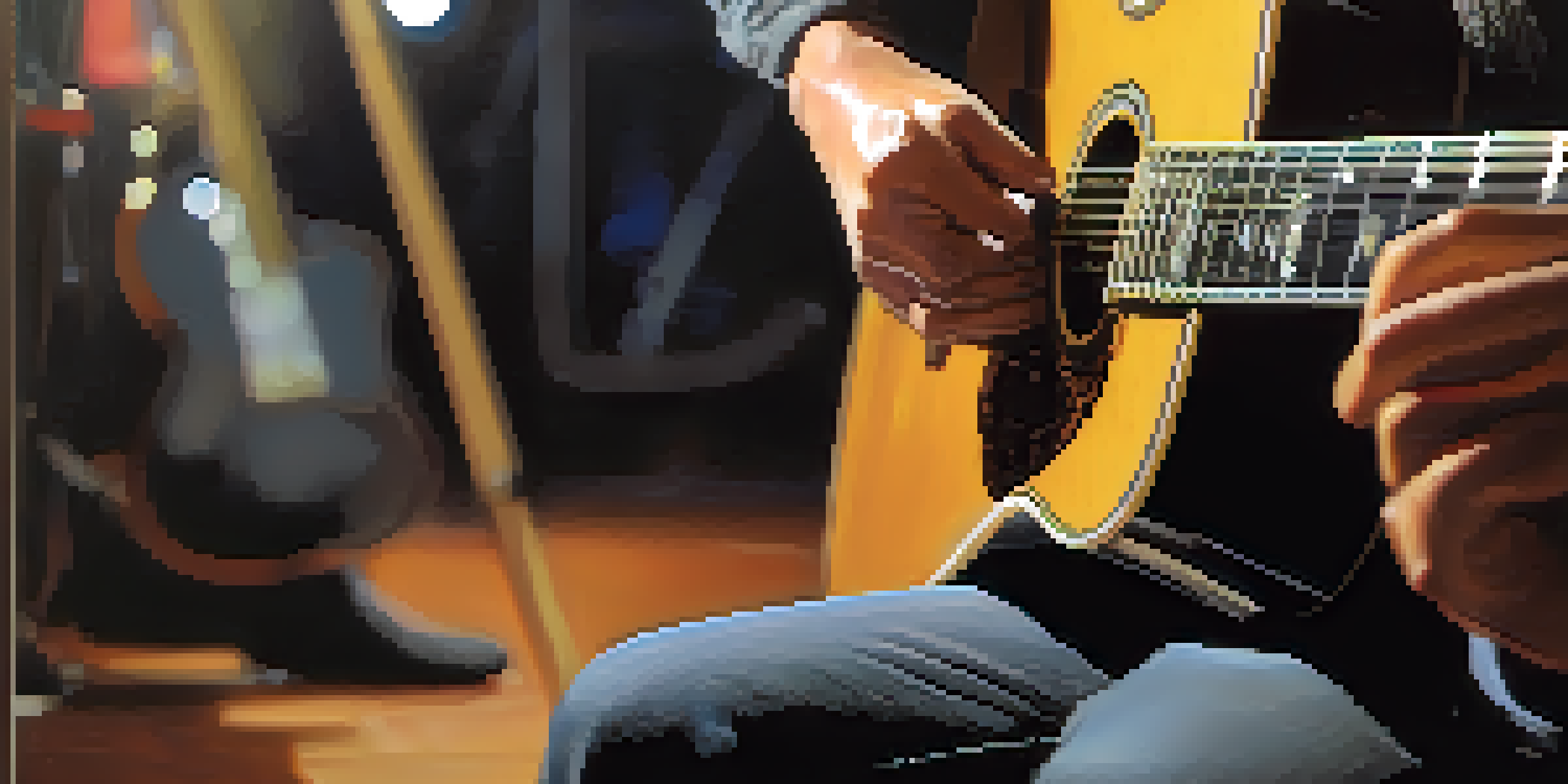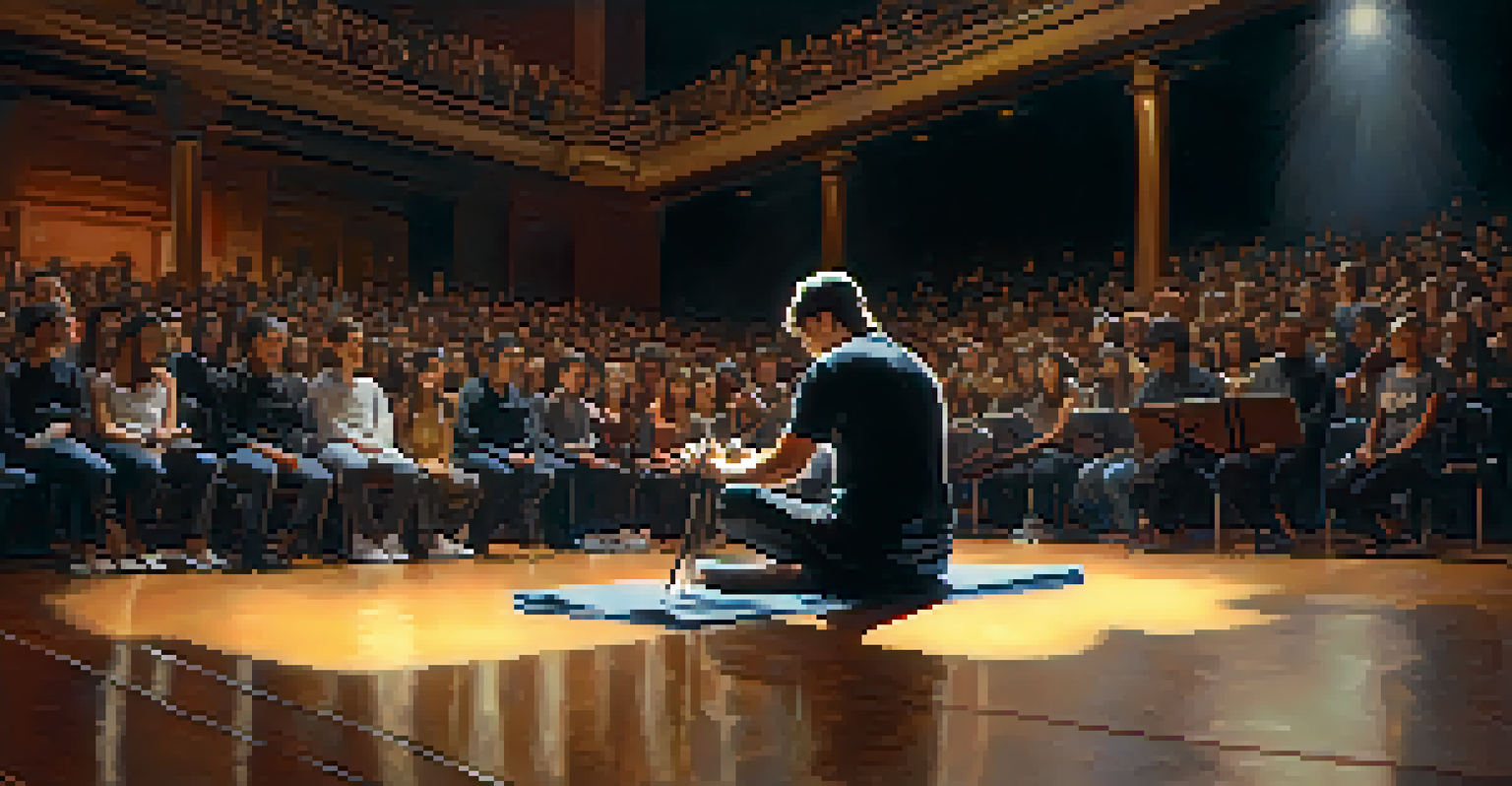Understanding Performance Anxiety in Musicians: A Complete Guide

What is Performance Anxiety and Who Does It Affect?
Performance anxiety, often referred to as stage fright, is a feeling of intense nervousness experienced before or during a performance. It's not just limited to musicians; actors, speakers, and athletes can also face similar challenges. In fact, studies suggest that up to 70% of musicians experience performance anxiety at some point in their careers.
Performance anxiety is a natural and common experience for performers, but it doesn't have to define you or your art.
This anxiety can manifest in various ways, including physical symptoms like shaking, sweating, or a racing heartbeat. Mentally, it can lead to fears of failure or embarrassment, often causing musicians to second-guess their abilities. Even seasoned performers aren’t immune; the pressure to deliver a perfect performance can be overwhelming.
Understanding that performance anxiety is common is the first step in overcoming it. Knowing that you're not alone can alleviate some of the pressure. Many successful musicians have shared their experiences with anxiety, emphasizing that it's a natural part of the performance process.
Common Symptoms of Performance Anxiety in Musicians
Performance anxiety can manifest in various symptoms, both physical and emotional. Physical symptoms might include shaking hands, a quivering voice, or even nausea. These reactions can make it difficult for musicians to perform at their best, leading to a cycle of anxiety and poor performance.

Emotional symptoms are just as significant, with feelings of dread, self-doubt, and fear of negative judgment playing a large role. Musicians may struggle with negative thoughts that spiral, creating a mental block that hinders their ability to focus. This emotional turmoil can not only affect performance but also diminish the joy of making music.
Understanding Performance Anxiety
Performance anxiety affects many musicians, leading to physical and emotional symptoms that can hinder their ability to perform.
Recognizing these symptoms is crucial for musicians. By understanding how performance anxiety affects them, musicians can begin to address their feelings and seek strategies to manage their anxiety effectively.
The Psychology Behind Performance Anxiety
At its core, performance anxiety often stems from fear—fear of judgment, fear of failure, or even fear of success. This fear can create a heightened sense of self-awareness, where musicians become overly focused on how they are perceived by their audience. It's as if they’re under a microscope, amplifying their anxiety.
The only thing we have to fear is fear itself, and that applies to performance anxiety as well.
Cognitive distortions, such as catastrophizing or personalizing, can also fuel performance anxiety. For example, a musician might assume that one missed note will ruin their entire performance, which can lead to increased anxiety and stress. Understanding these thought patterns can help musicians reframe their perspectives.
By recognizing the psychological triggers of performance anxiety, musicians can work towards reframing their thoughts and developing healthier coping mechanisms. This understanding is key to transforming anxiety into a more manageable experience, allowing musicians to focus more on the music and less on the fear.
Preparing for Performance: Tips to Reduce Anxiety
Preparation is one of the most effective ways to combat performance anxiety. This can include practicing thoroughly, setting realistic goals, and visualizing a successful performance. The more prepared a musician feels, the more confident they are likely to be when it’s time to perform.
Incorporating relaxation techniques into the preparation process can also be beneficial. Deep breathing exercises, meditation, or light stretching can help to calm nerves and create a sense of focus. Such practices can serve as a pre-performance ritual, grounding musicians before they take the stage.
Effective Coping Strategies
Implementing techniques like positive self-talk and mindfulness can help musicians manage their performance anxiety effectively.
Lastly, it’s important for musicians to acknowledge their feelings and talk about their anxieties. Sharing experiences with fellow musicians can create a supportive environment, making it easier to navigate the challenges of performance anxiety together.
Mindfulness and Its Role in Managing Anxiety
Mindfulness is a powerful tool for managing performance anxiety. By practicing mindfulness, musicians can learn to stay present in the moment, reducing excessive worry about the past or future. This focus can help to minimize anxiety symptoms and enhance overall performance quality.
Techniques such as mindful breathing or body scans can help musicians to ground themselves before a performance. These practices encourage awareness of thoughts and feelings, allowing musicians to acknowledge their anxiety without letting it take control. By accepting their emotions, they can create a more balanced mental state.
Integrating mindfulness into daily routines can lead to lasting benefits, not just for performances but in many aspects of life. This practice fosters resilience, enabling musicians to approach challenges with a clearer mind and a more positive outlook.
Coping Strategies for Musicians Facing Performance Anxiety
Developing effective coping strategies is essential for managing performance anxiety. Techniques such as positive self-talk can help counteract negative thoughts. For instance, replacing 'I can't do this' with 'I am prepared and capable' can shift a musician's mindset significantly.
Another effective strategy is to focus on the music rather than the audience. When musicians immerse themselves in the performance, they can shift their attention away from potential judgment, which can help ease anxiety. Connecting with the music creates a deeper experience and can lead to more authentic performances.
When to Seek Professional Help
If performance anxiety significantly impacts a musician's enjoyment or ability to perform, consulting a mental health professional can provide vital support.
Lastly, seeking professional support, whether through a coach, therapist, or support group, can provide musicians with additional tools and perspectives. This support can be invaluable, offering insights that can help musicians navigate their anxiety in a constructive way.
When to Seek Professional Help for Performance Anxiety
While many musicians experience some level of performance anxiety, there are times when it may be beneficial to seek professional help. If anxiety is significantly impacting a musician's ability to perform or enjoy their craft, it may be time to consult a mental health professional. They can provide tailored strategies and support that can make a real difference.
Therapies such as cognitive-behavioral therapy (CBT) have been shown to be effective in treating performance anxiety. These approaches help individuals identify and challenge negative thought patterns, creating healthier habits and coping mechanisms over time. This form of therapy can empower musicians to take control of their anxiety.

Ultimately, recognizing that seeking help is a sign of strength is vital. Breaking down the stigma around mental health in the arts community can encourage more musicians to pursue the support they need, fostering a healthier and more supportive environment for all.